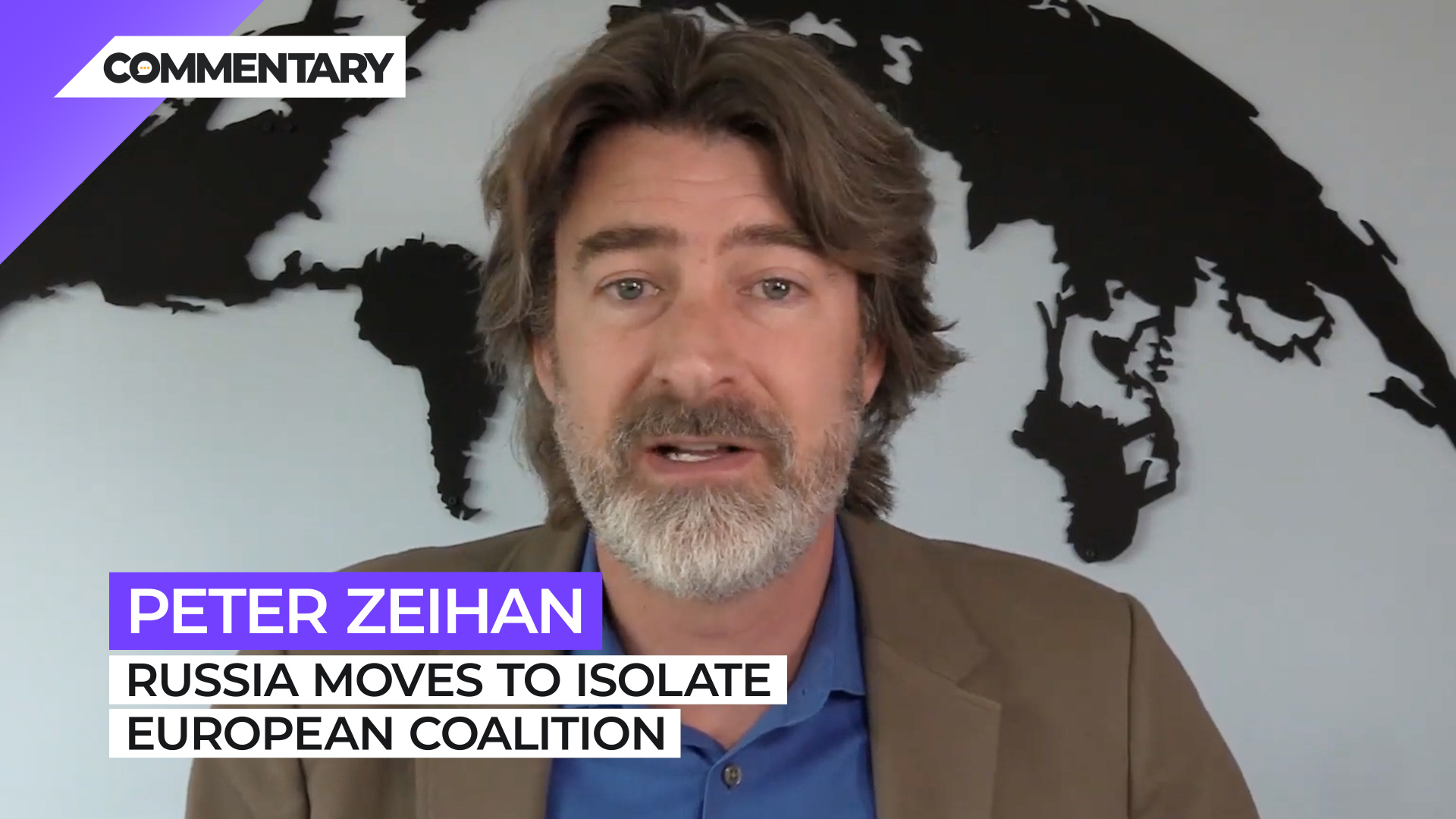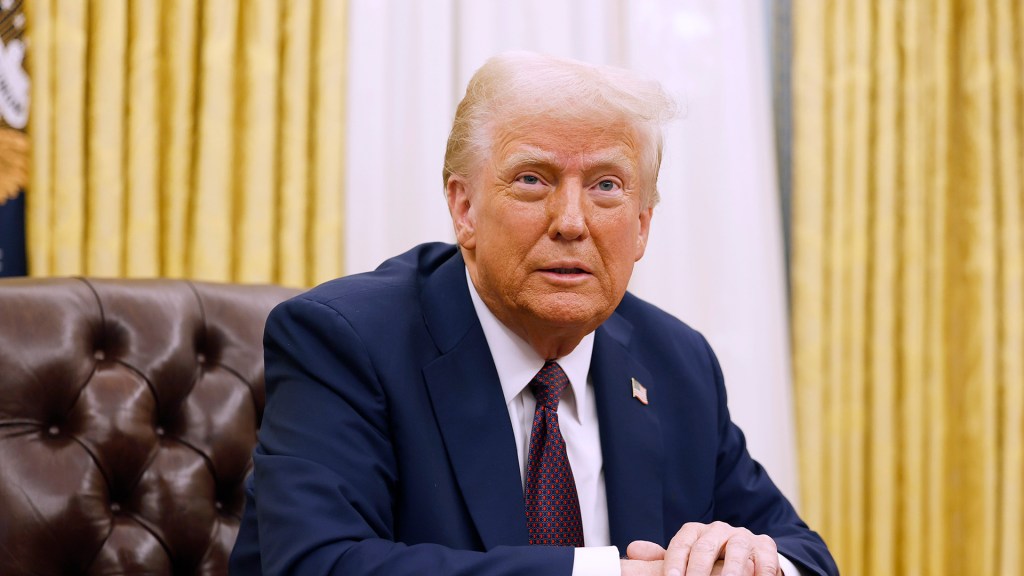
Commentary
-
Our commentary partners will help you reach your own conclusions on complex topics.
Hi everyone. Peter Zeihan here coming to you from Colorado.
Today, I want to talk about one of the more recent Russian moves in order to isolate and break up the European coalition against them.
Over the course of the last few days, the Russians have started limiting natural gas supplies specifically to Bulgaria and Poland, with the intent of forcing on the rest of Europe payment in rubles specifically.
And there are a number of economic entities, not governments at this point, just private players in Germany, Austria, and Hungary that are agitating within the European system to be able to do just that because the Austrians, the Germans, and the Hungarians are particularly wired into the Russian system.
So first a few words on infrastructure. There are a number of pipes from the Russian space that go into the European space that allow the Russians to selectively cut off specific countries.
So for example, there’s the Nordstream line, which is the biggest of them, which goes under the Baltic Sea directly to Germany, which would allow the Russians, if they wanted to, to specifically cut off the Germans. But they’re trying to pry the Germans out of the coalition. So that is still flowing and gas from that line passes on to places like Hungary and Austria.
There are older lines that go through Ukrainian space into Bulgaria. And that’s exactly what they do with the Bulgarians. They’re just shutting that line off. There are downstream customers, but they’re not very big. So it’ll be very easy for the Russians to know if the Bulgarian are tapping the line against the Russian wishes. Same thing is happening with something called the Yamal line that goes through Belarus into Poland. So what the Russians are trying to do is get some countries to violate their contracts.
The Russians are obviously violating their own, obviously from a legal point of view, this is a war.
But the Europeans love a good meeting. They love a good bureaucracy. So anything that puts problems within the gears, throw some sand into the operation. That’s what the Russians are after.
Now the European Union Commission president has already said that any payments in rubles are clearly against the sanctions regime. But this is the first time the Europeans have had a meaningful sanctions regime versus everything.
Now, this kind of takes us two places. First all, the big picture. In my opinion, the takeaway capacity for Russian energy has been dropped so much between sanctions and boycotts that we’re seeing pressure build up through the entire Russian system all the way to the well heads. And once that happens, the Russian are gonna have to shut in a lot of production.
So at the end of the day, at some point this summer, all of this is gonna go away anyway. And if it’s gonna seem like a moot point globally, and globally, it is, but that’s not what the Russians are after.
The Russians are after kind of the second point, which is if they get cracks and fissures within the European coalition to open up over energy, then they have a lot more breathing room.
The ultimate goal, kind of the gold standard for the Russians would be to get the Germans to no longer participate in the sanctions and boycotts at all. And if the Germans do that, the Austrians and the Hungarians who could be counted on to be brought along for the ride. If the Russians can get the Germans to no longer play in the war, that is pretty much all the logistical capacity for the entire NATO alliance for shipping things into Ukraine.
That’s ultimately what the Russians are after here. And they have a reasonable, reasonably good chance of getting it. The Russians know that the Germans have very few options. They don’t have the ability to import natural gas from the sea. They don’t have a single LNG terminal. They don’t have the ability to reroute crude because the two refineries that they have that use Russian crude exclusively are landlocked, and they have no connection to ports. So the Europeans are gonna have to get very creative here.
Now, luckily the Europeans have shown a degree of creativity that we haven’t seen out of them for decades. So for example, about three weeks into the war, the Europeans linked up their electrical grid to the Ukrainian grid. Now Ukraine has 45 million people. It’s about the same size as Texas. That’s kind of a big deal, and they did it in two weeks.
So there’s a possibility they can do the same thing for the Austrians, the Hungarians, and the Germans, and the French basically turned all of their nuclear power plants up to max, and start shipping electricity in, and the Italians probably will do something similar, although they’ll be using different fuels, probably coal and even burning oil, but there are ways here to prevent this from being catastrophic.
The reason that this is happening at all is not simply because the Germans have tried to preserve some degree of relationship with Russia. It’s a lot deeper than that. The Germans are surrounded by potential rivals and anything that they can do in a time of peace to prevent those rivals from becoming hostile is something that they will do. And that’s been German policy since 1950. We’re past that though, while there are certainly some German interests economically that would like to preserve the relationship, the Russians are not going to stop.
And in Berlin at the state level, the Germans have accepted this, and they’re starting to build that alternate infrastructure. What they need is time. A cutoff today would end manufacturing in Germano centric, Europe. That is the heart of the European economy. They would fall not into recession, but into depression.
So every day that they can buy to add more infrastructure to bring in alternative options is a gift. And the Russians know that. And so the Russians are pushing for this now.
Historically, I’ve not been a big fan of the European Union. I mean, I love their goal. I love the idea of peace and democracy and unity in Europe. I think that’s great. I just don’t think it’s very feasible, especially in the world we’re devolving into where over watched by the United States is in question, but the Russians have moved so far so fast, so angrily, so rudely that Europe is experiencing the greatest moment of unity that they have had since the Treaty of Westphalia in 1648. That’s kind of a big deal.
So I do have a little bit of hope, but ultimately the decision here, rests with Berlin, and we’re gonna know within like a couple of weeks, how this is gonna break down because the Russians aren’t gonna stop, but Poland and Bulgaria are hardly the last countries that they’re going to use in order to drive a wedge between the Germans and everyone else. All right. That, that’s it for me until next time.
-
Hurricane Helene hits US coast, Appalachia and beyond
Hurricane Helene hit Florida and Georgia overnight between Sept. 26 and 27 as a Category 4 hurricane, and accompanying storms will continue reaching deeper into the continental United States today. Dangerous flash flooding from the hurricane, known as storm surge, was some of the worst flooding that the Tampa Bay area has ever seen, and… -
Israel holds upper hand against Lebanon, Hezbollah and Iran
On Wednesday, Sept. 25, Hezbollah launched a ballistic missile at Tel Aviv in retaliation for Israel’s explosive pager attack that blew up devices across Lebanon. Although Israel’s defense systems intercepted the surface-to-surface missile, the attempted strike on Tel Aviv marked a significant escalation by Hezbollah. Since the siege on Gaza began, shortly after the Oct. 7, 2023,… -
The Sinaloa Cartel civil war
Fears of a civil war within the Sinaloa Cartel are growing as violence between competing factions within the cartel continues. The Mexican Army has dispatched around 600 elite troops to Sinaloa to help quell those fears, in addition to roughly 2,200 regular soldiers and National Guard. Watch the above video as Straight Arrow News contributor… -
New Ukrainian weapons hit Russia where it hurts
Ukrainian drones struck a major Russian ammunition depot, triggering a massive explosion that was captured on camera. According to the Ukrainian military, 2,000 tons of munitions had arrived at the depot before the attack. Over the past two years, Ukraine has significantly increased its domestic drone production, allowing it to scale up attacks on military… -
Weighing social costs vs. economic benefits on immigration
Global human migration is one of the defining elements of our current historical era, according to the United Nations. Migrants face both the incentives to leave — forced out by climate change, crime and corruption, extreme poverty or violence — and incentives for where to go, based on available job opportunities and so on. Migration…
Latest Stories
-
 Getty Images
Getty Images
Gene Hackman’s dead dog misidentified as details continue unfolding
-
 Getty Images
Getty Images
Sexual violence used as war tactic against Sudanese children: UNICEF
-
 Getty Images
Getty Images
Trump praises BlackRock for $19 billion Panama Canal investment
-
 Getty Images
Getty Images
President Trump announces arrest of Kabul airport bombing suspect
-
 Getty Images
Getty Images
Supreme Court requires Trump admin to pay $2B in frozen foreign aid
Popular Opinions
-
In addition to the facts, we believe it’s vital to hear perspectives from all sides of the political spectrum.
Latest Opinions
In addition to the facts, we believe it’s vital to hear perspectives from all sides of the political spectrum. We hope these different voices will help you reach your own conclusions.
The opinions published in this section are solely those of the contributors and do not reflect the views of Straight Arrow News.





















Latest Commentary
We know it is important to hear from a diverse range of observers on the complex topics we face and believe our commentary partners will help you reach your own conclusions.
The commentaries published in this section are solely those of the contributors and do not reflect the views of Straight Arrow News.
Dr. Frank Luntz
Pollster and Political Analyst‘Biased’: What Americans think of ‘mainstream media’
‘Getting rid of them’: Americans discuss Trump and immigration
‘Woke’: Why some Biden 2020 voters backed Trump in 2024